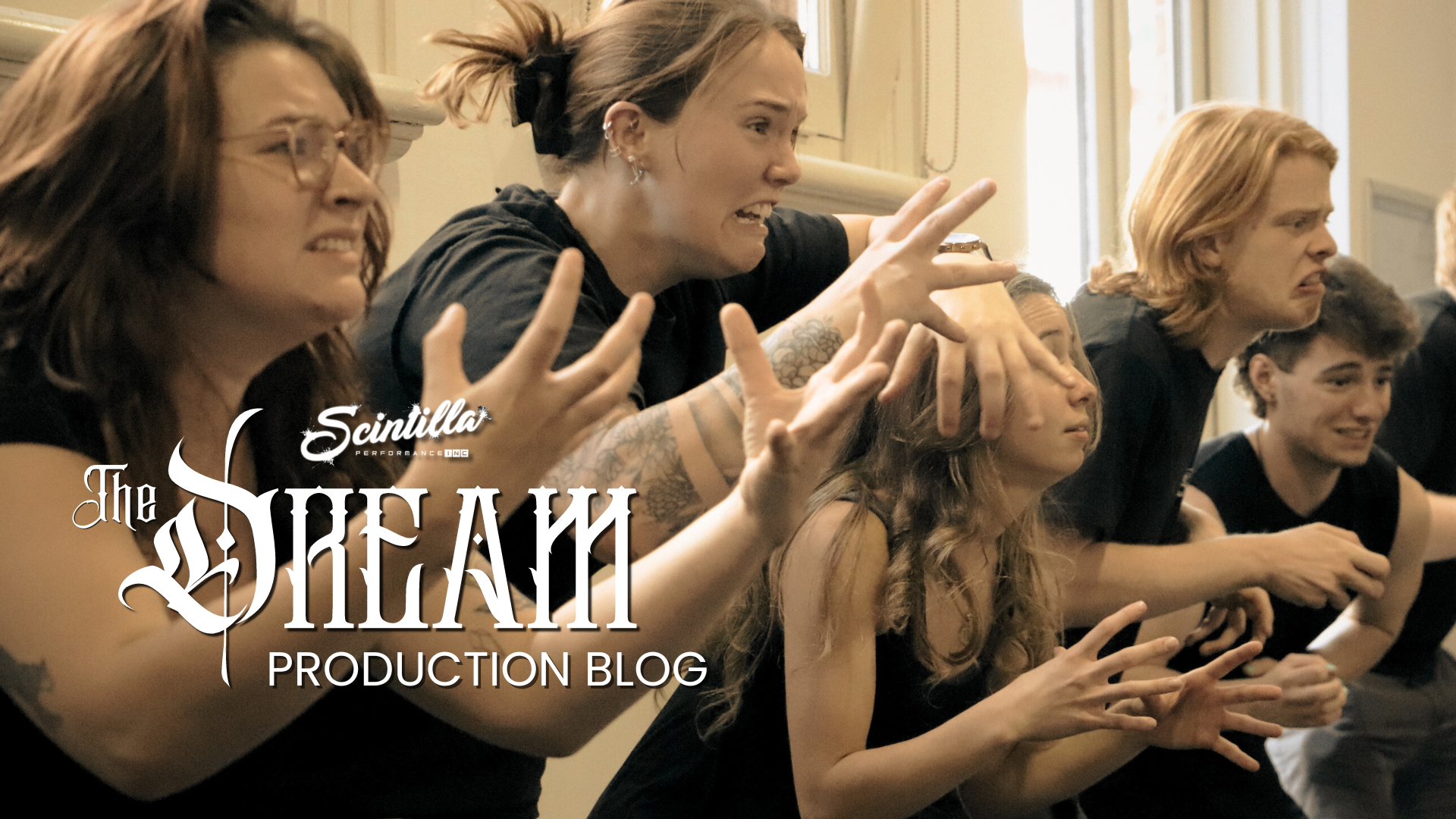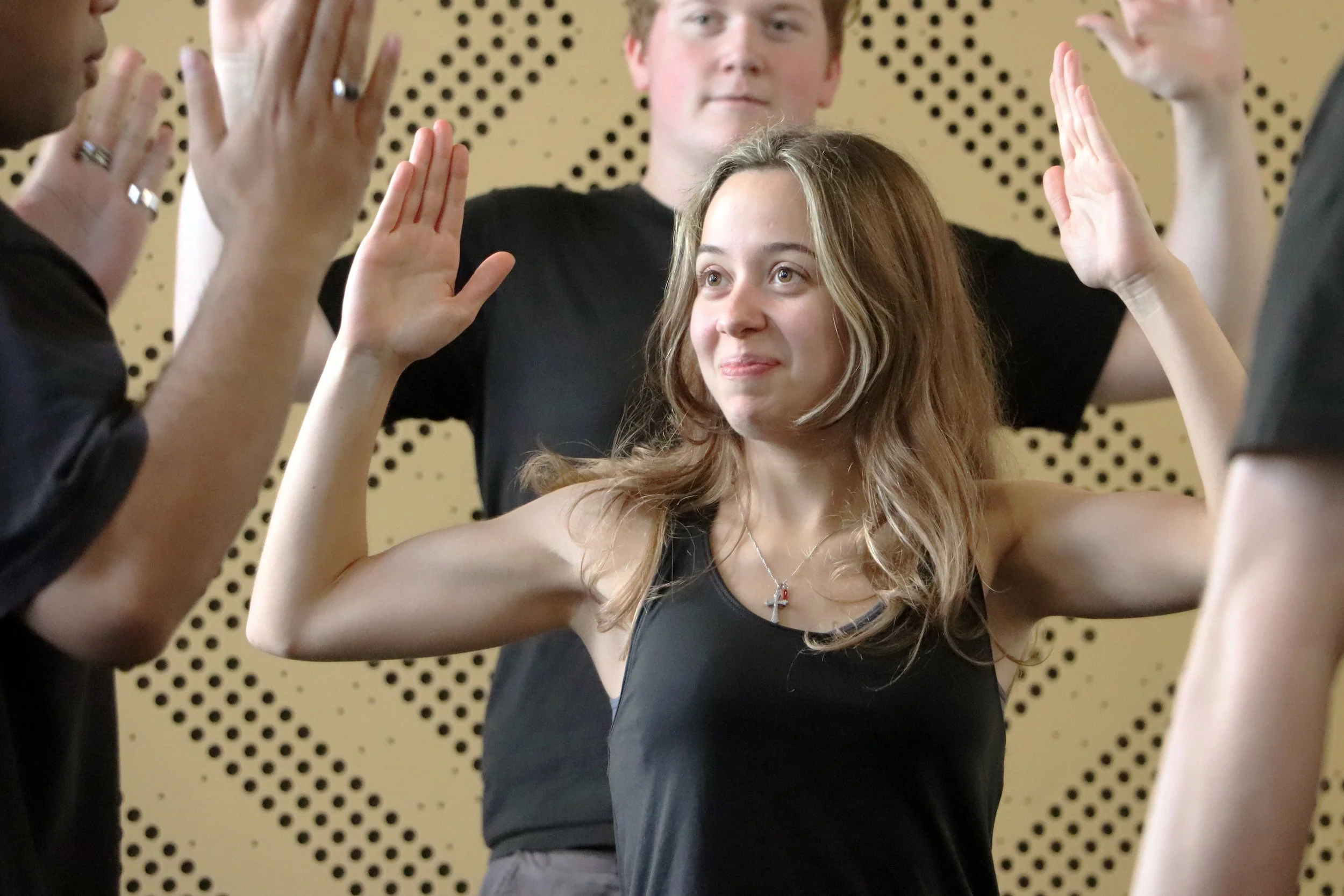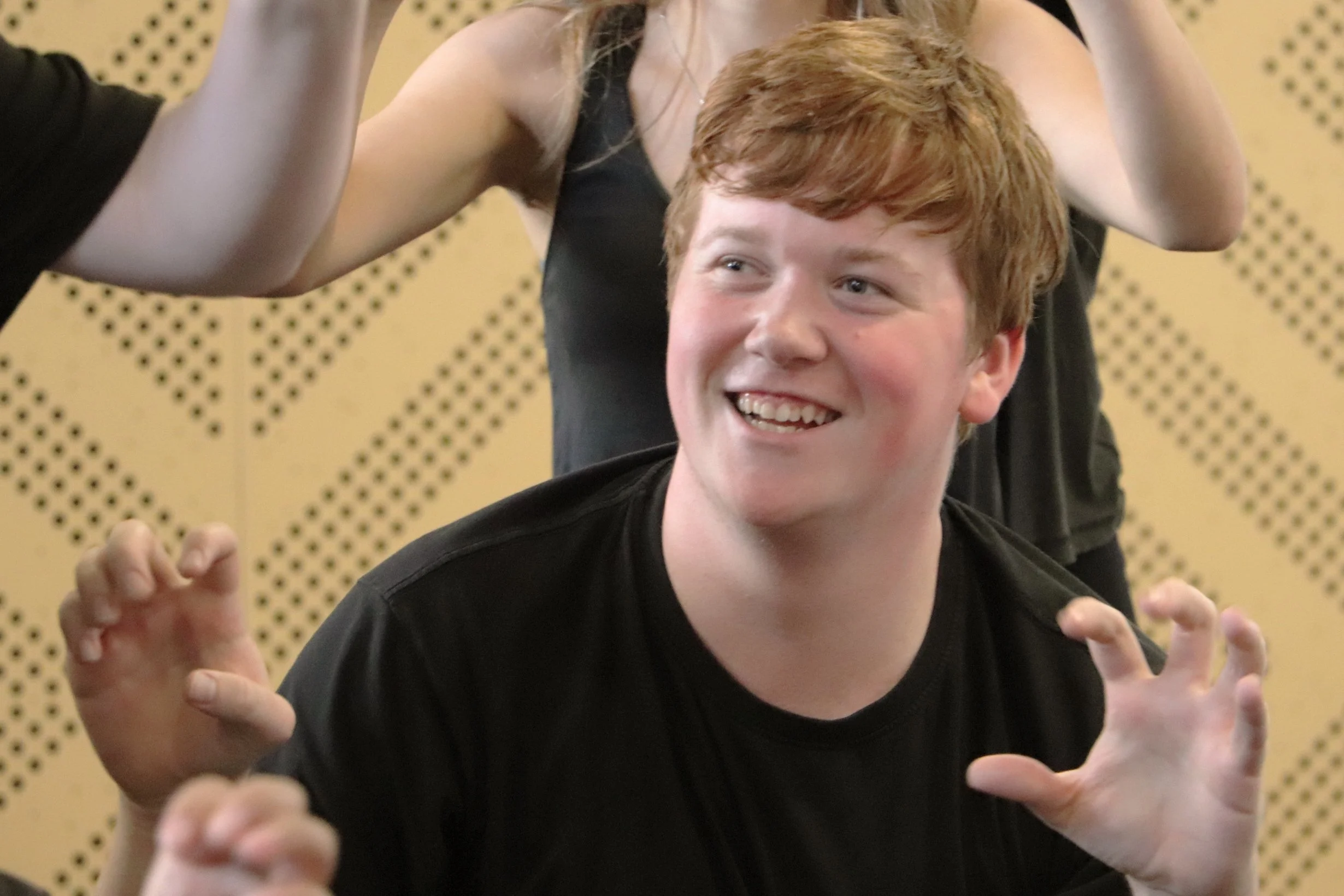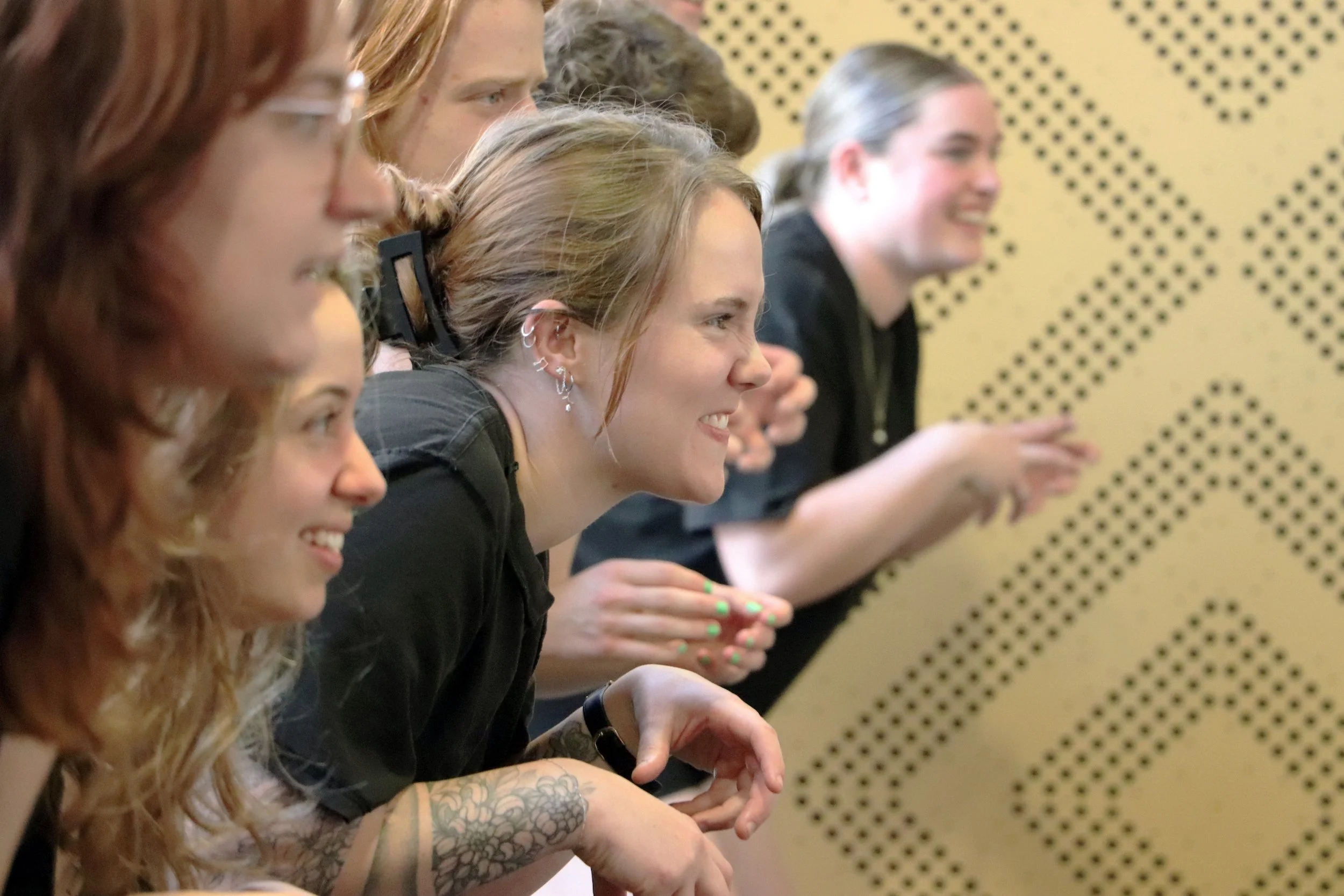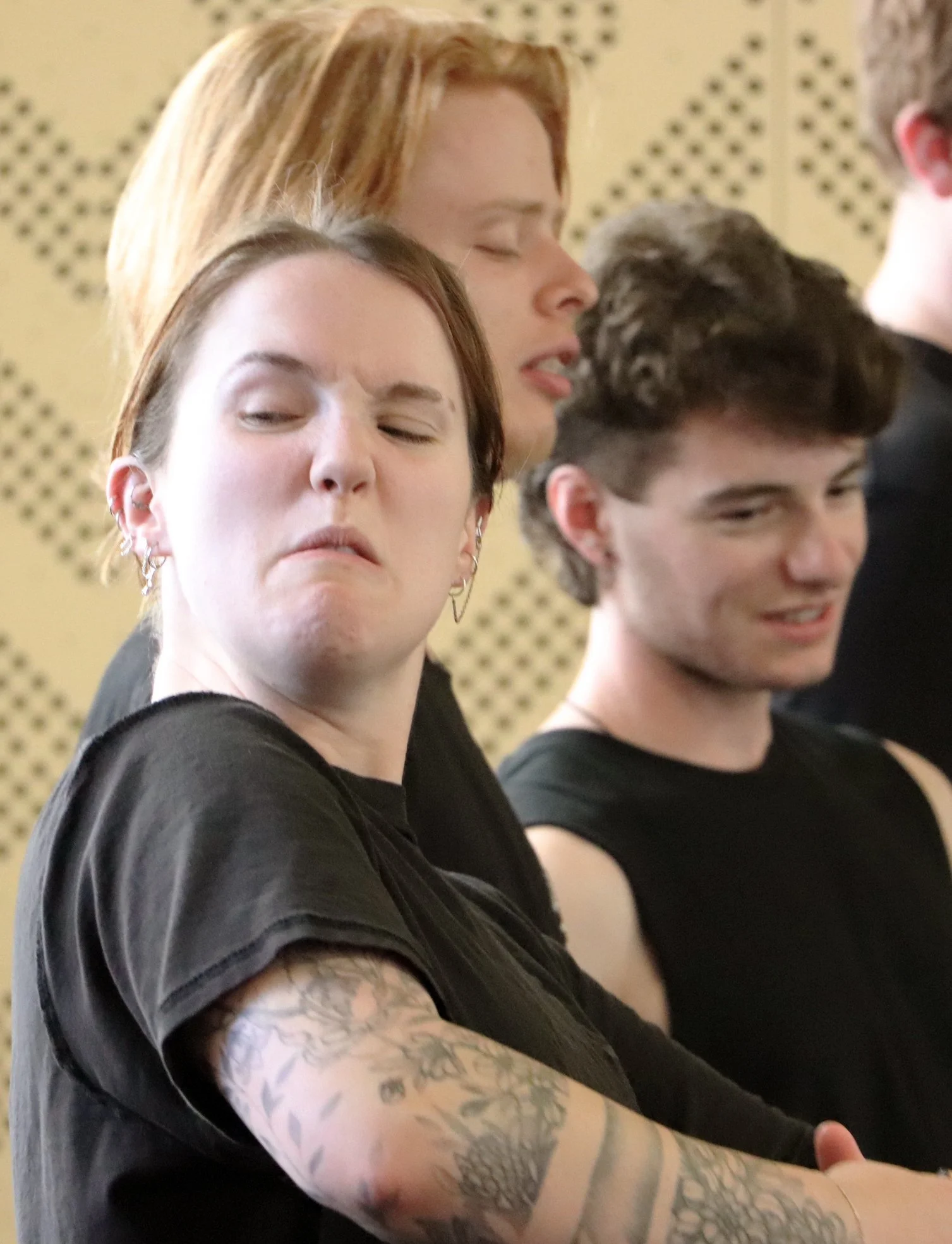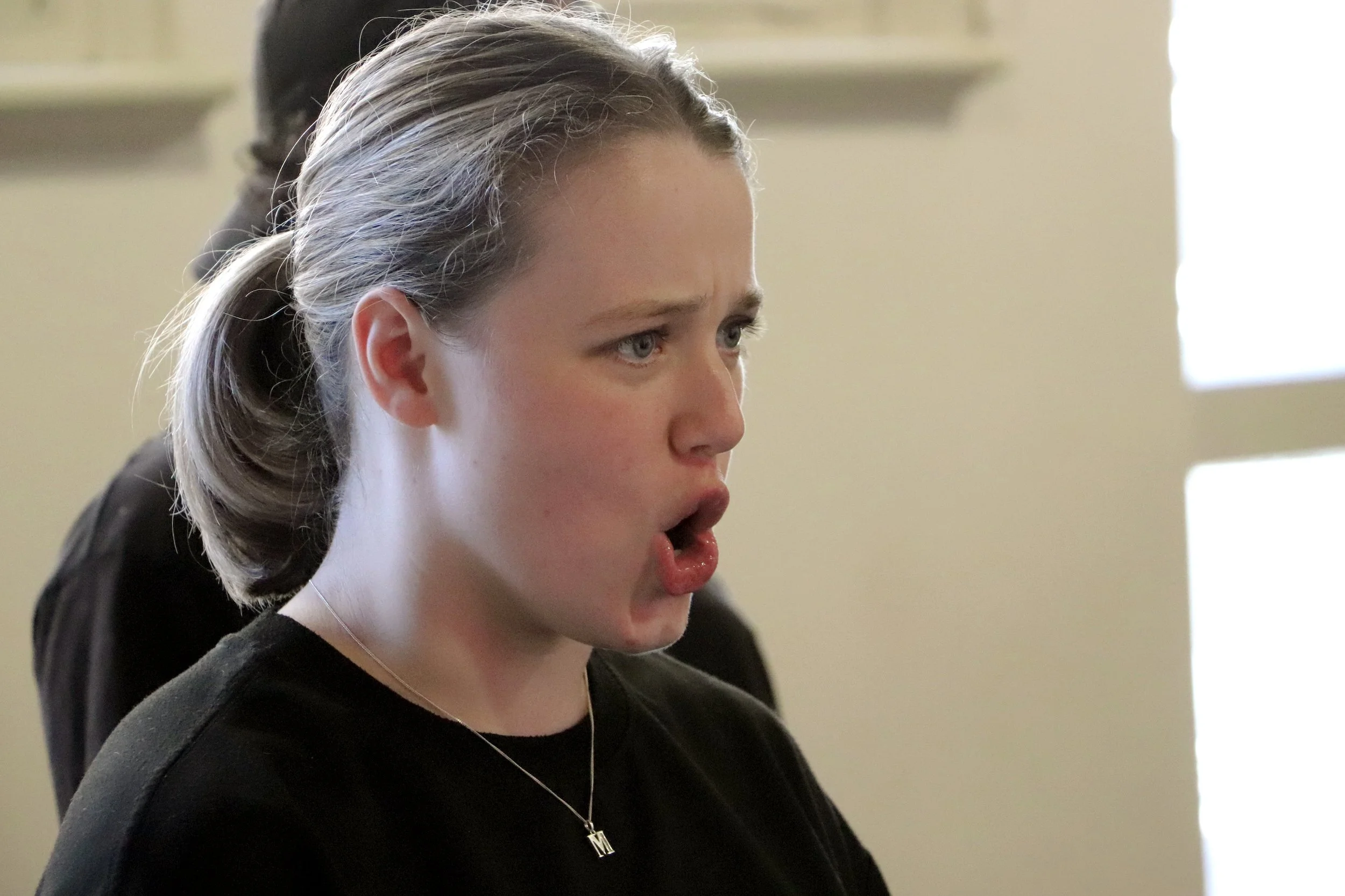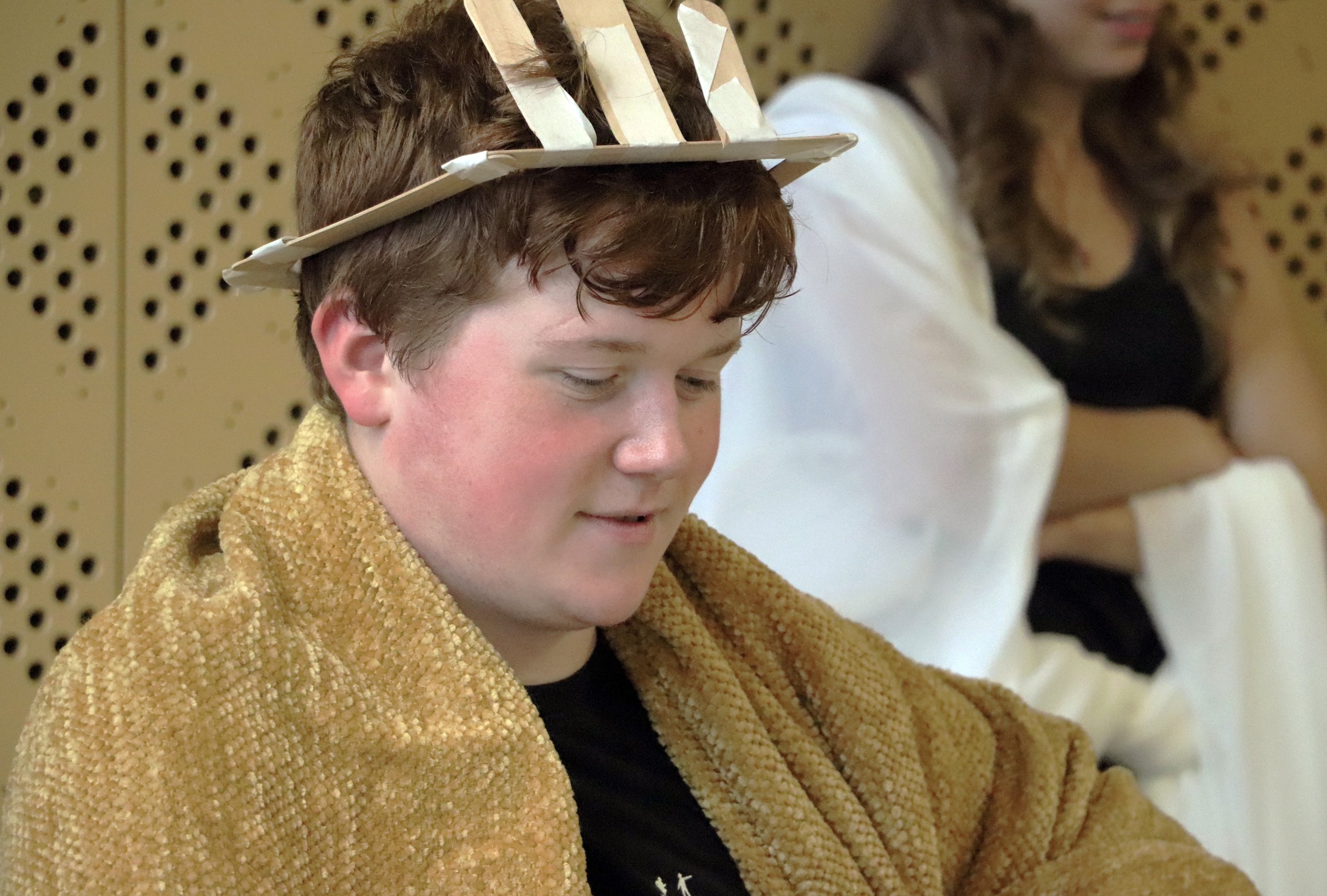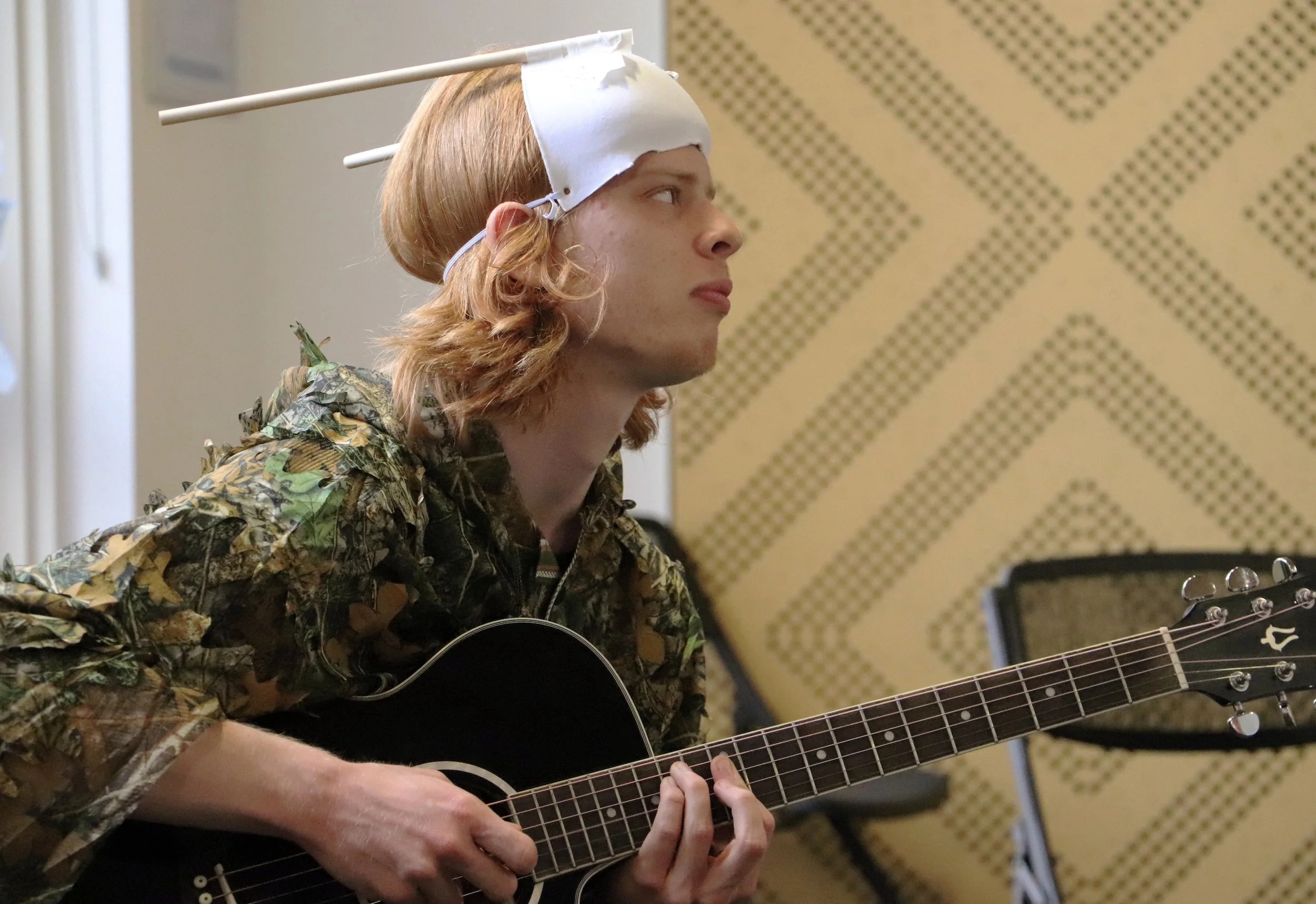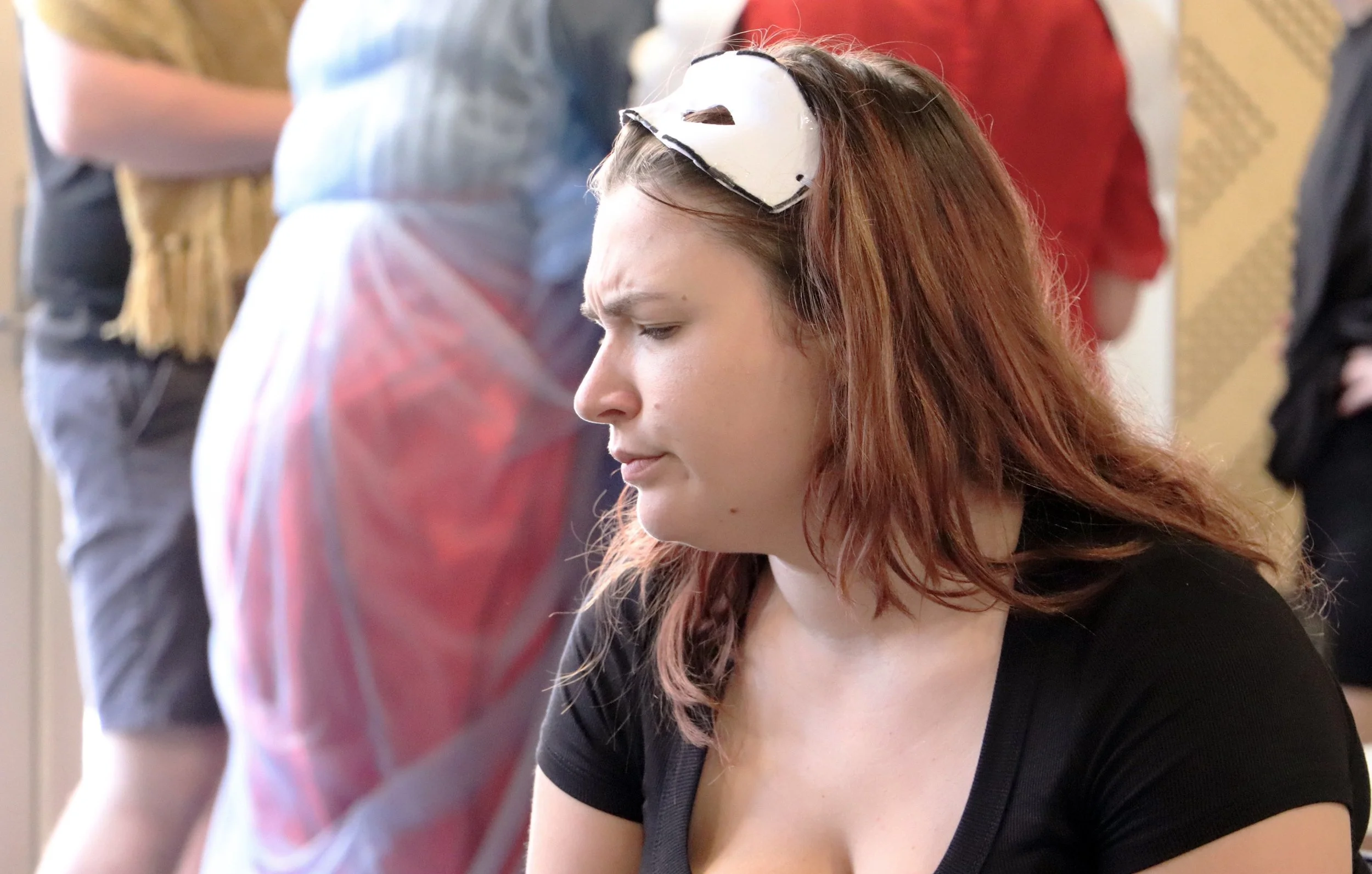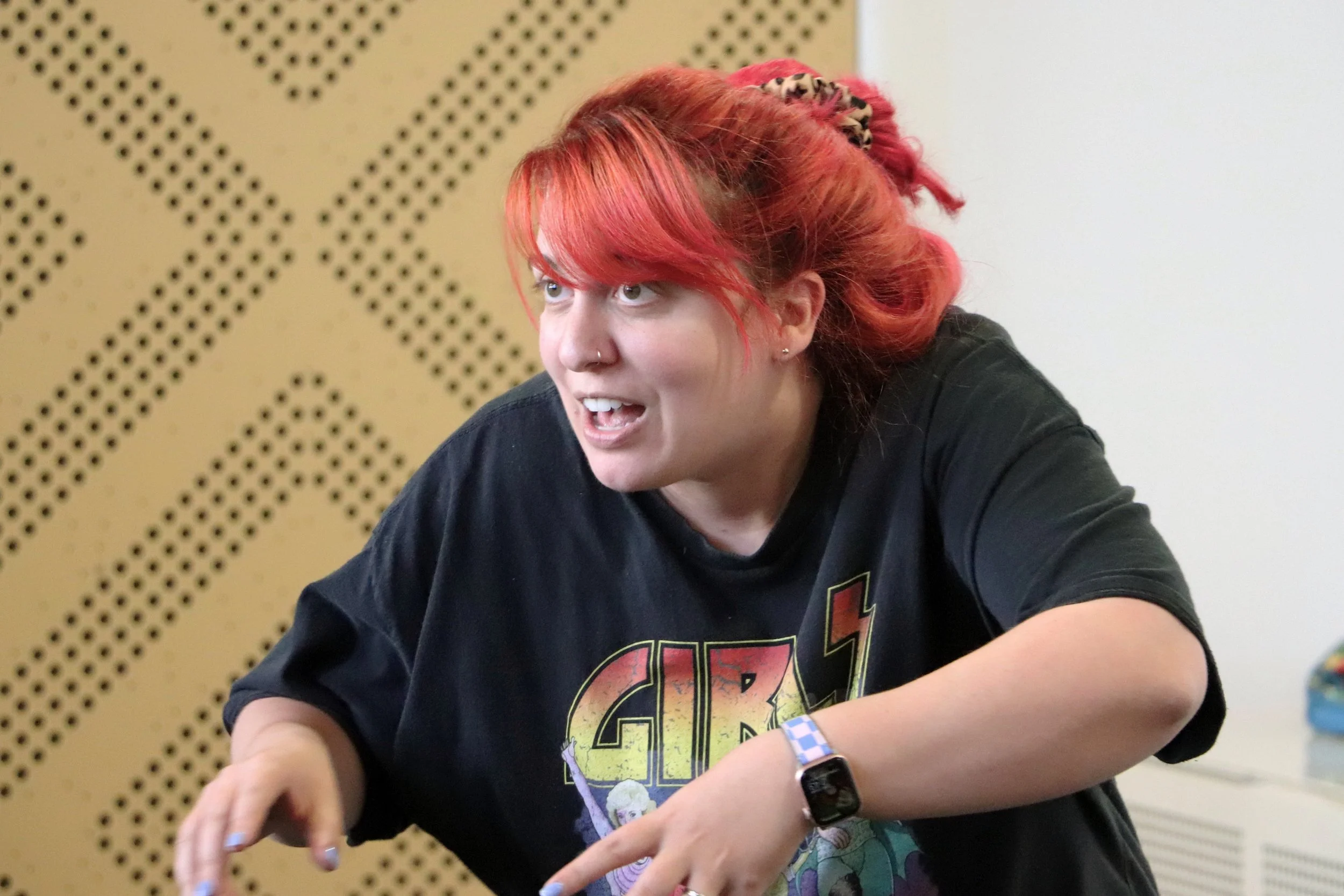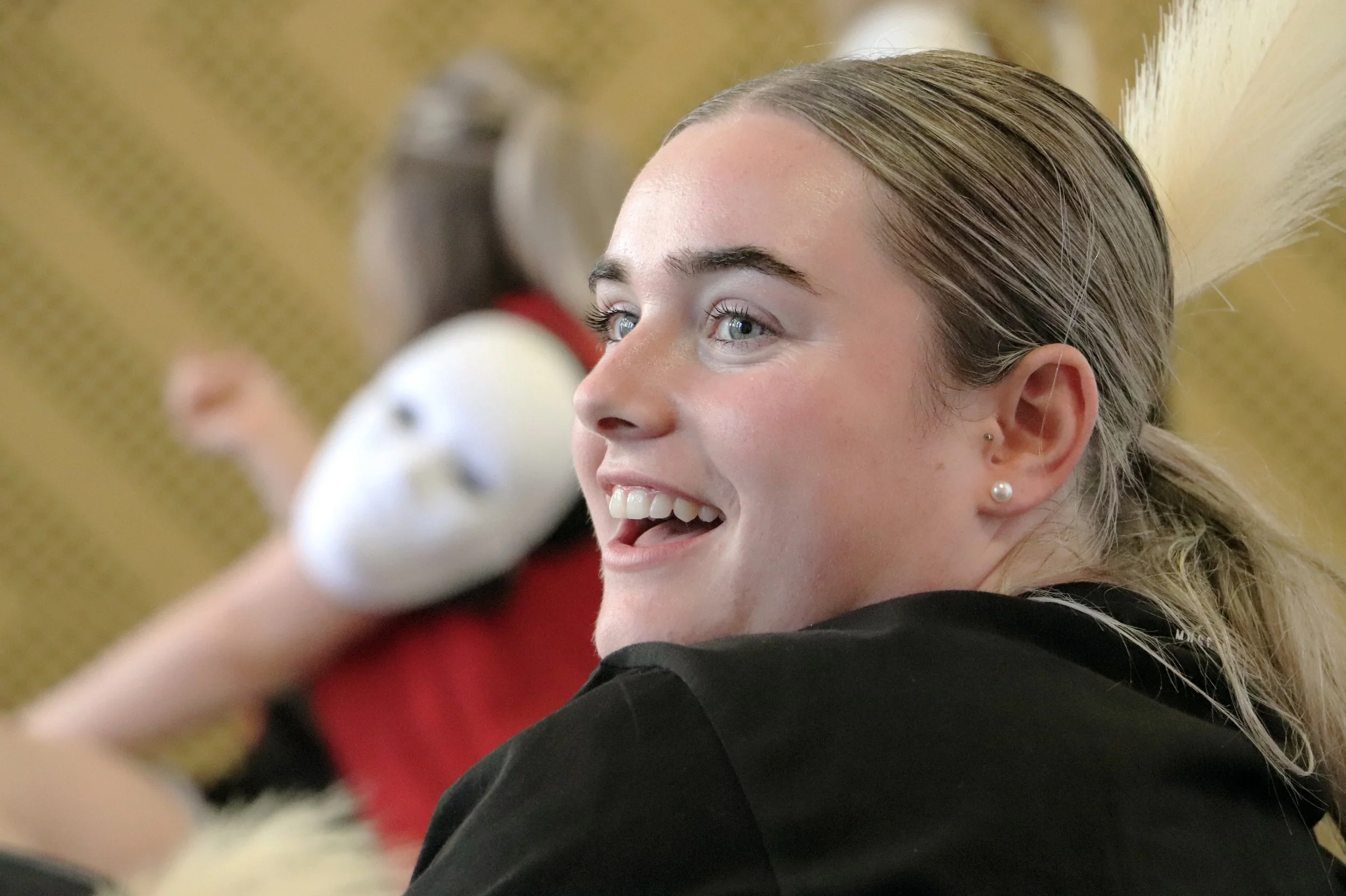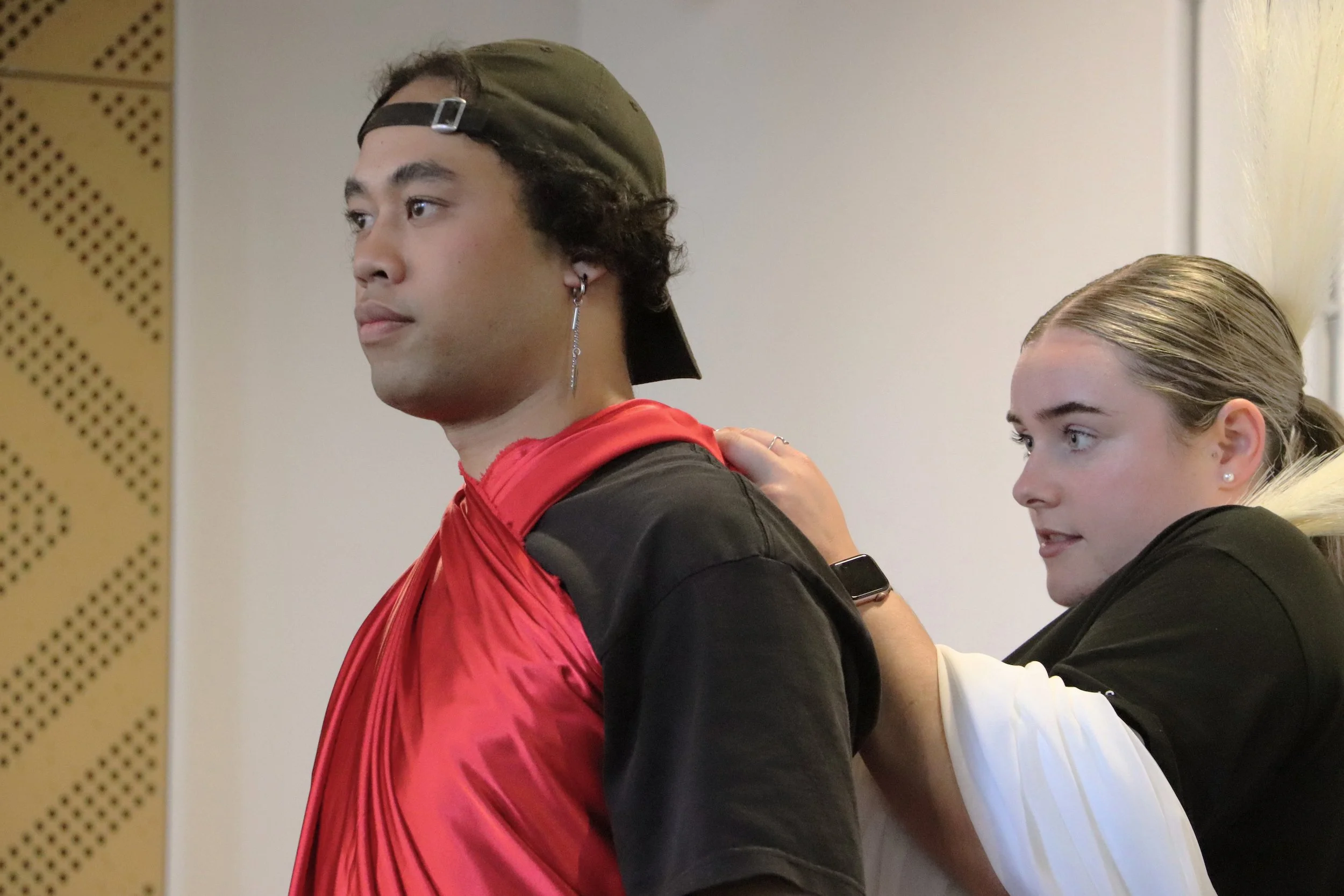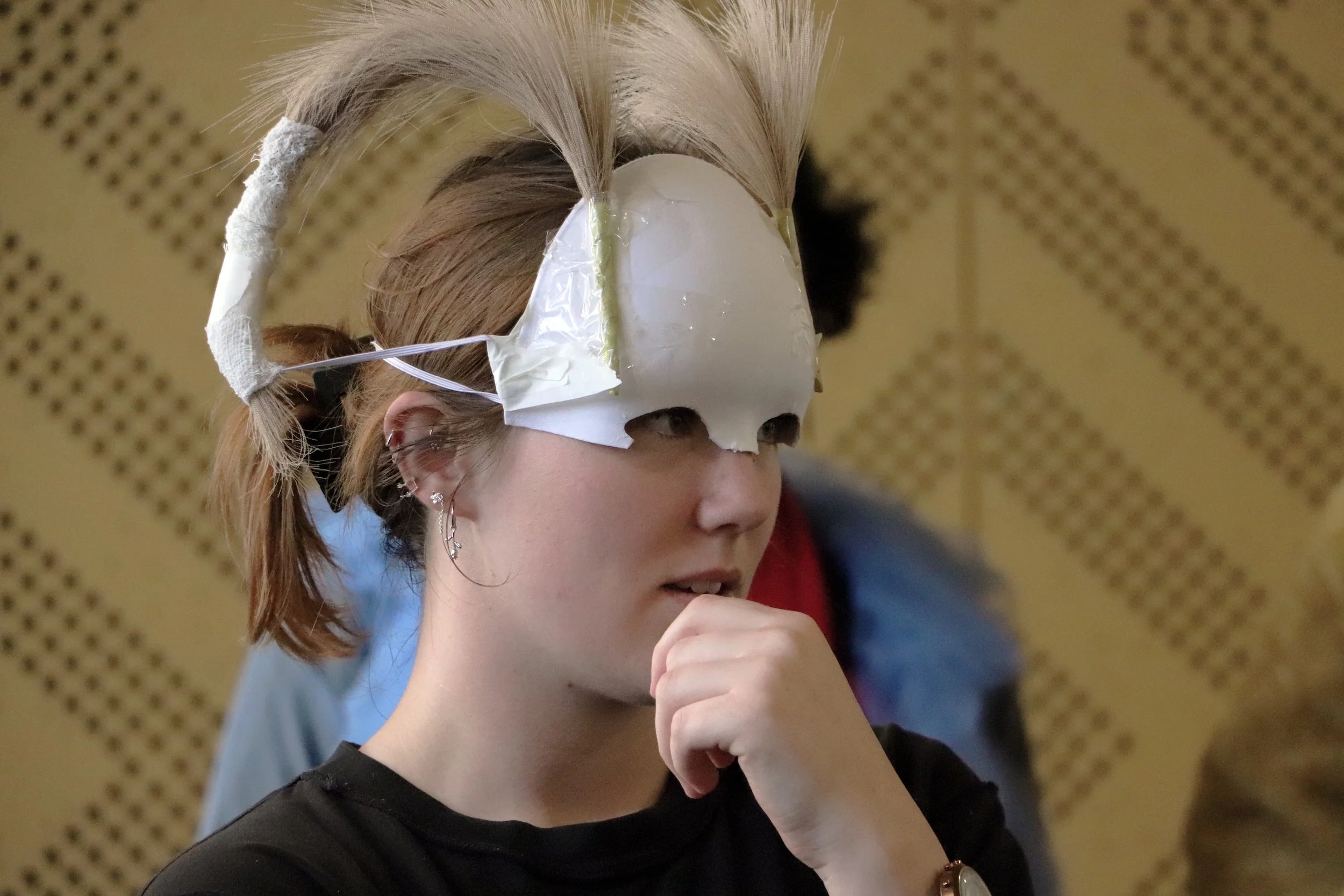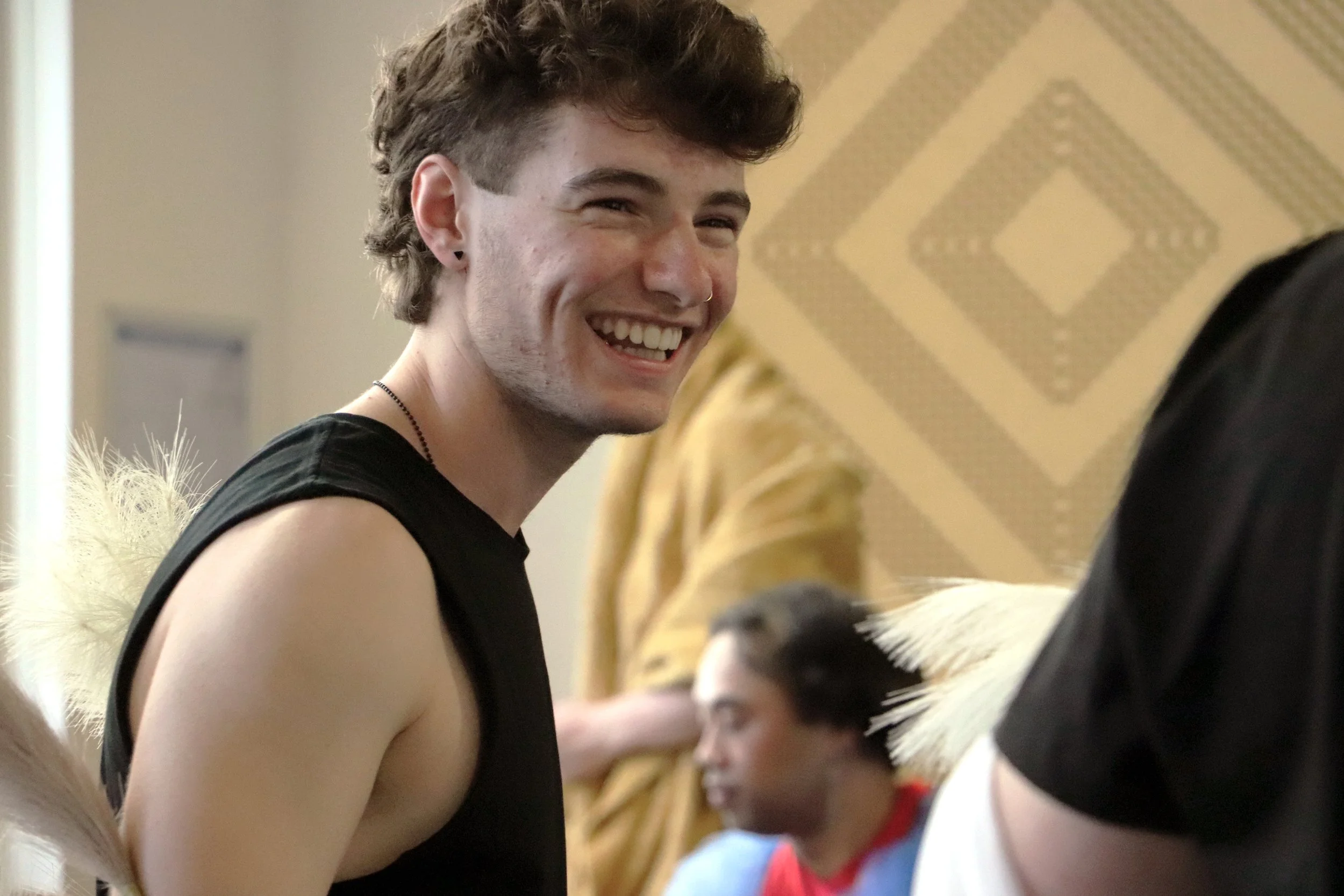Devising Workshop #4 - Creating Characters
The penultimate workshop of Part 1 of our 2024 Performance Program - an extended creative development of the ideas, concepts, and characters of what will inform our production of THE DREAM in October - was an opportunity to consolidate the knowledge and skills developed by our devising team over the preceding three weeks.
So far, we’ve dived deep into the primary influences of THE DREAM: Greek and Japanese theatre, narration, myths and legends, the conventions of tragedy, A Midsummer Night’s Dream, masks, and physical theatre. This week was all about channelling this knowledge and awareness into an essential aspect of performance: Inhabiting a character and actually performing!
Creating a character is the most important thing an actor can do. Well… obviously! It seems silly when you put it like that. But think about it: An actor has to do a lot of things on stage. They have to remember cues and blocking; say the right line at the right time; listen attentively to everything being said to them; anticipate scene changes, entrances, exits; be emotionally present and engaged with the action on stage; be aware of where their light is, and how far they can go before they fall off the stage. Actually acting, on top of all that, is insane - like trying to juggle while doing quadratic equations. The human mind can only do so much at a time, and for most people, just being themselves - let alone someone else! - is a full-time job.
A posse of Pantalone’s proceed to pounce upon the unsuspecting public.
Part of the alchemical formula for making all these things work is to create a strong character. When you have a strong character - one that’s well-rounded, clearly defined, filled with personality and life - then the “actor” part of you can relax a little; you can let the character, the persona you’ve created, take the spotlight, and carry some of the mental load. When you have a strong character, it’s not you listening for your cue and responding in scripted sequence; it’s the character, responding authentically. It’s not you travelling around the stage, from mark to mark and light to light; it’s the character, naturally inhabiting their environment. It’s not you presenting emotions and feelings you may or may not feel in the moment; it’s the character, expressing honest reactions to events that shatter or delight them.
And if the audience believes in the character enough, then anything the character says or does - whether it’s intentional, accidental, or serendipitously coincidental - is good! It becomes just… part of the character. A strong character is like a comfortable mask an actor can slip on or off as they need; it makes everything on stage feel real and organic, and allows the character to behave in ways that the actor might never imagine doing as themselves.
Ironically, using an actual mask is the fastest and most effective way to create a character, and draw a clear line between actor and persona. Historically, this is how masks have been used in the theatre - to clearly indicate, in the broadest, most efficient way possible, that the people the audience sees on stage are not “real”, but roles being performed. And because a mask abstracts a person - that is, it makes them “something-closely-resembling-a-real-person-but-impossible-to-mistake-for-a-real-person” - and makes nuances of expression impossible, stock characters became a staple of theatre in the Middle Ages.
Zeus, in DIY crown and robe, prepares to serve his favourite meal at the family dinner.
Example! Picture it: Italy; the Renaissance. The Medici’s are back, baby, and Michelangelo is putting the finishing touches on the Sistine Chapel. Theatre is performed in the streets of Florence by a highly-trained troupe of actors, playing in the style of “Commedia Dell’Arte”. Scenarios are fast-paced, improvised, self-aware, and hysterical.
Appearing in each scenario are a core group of stock characters, all instantly recognisable to the audience by their stylised stance, costume, and mask. Each character is a satirical take on a certain class of society: Masters, Academics, Aristocrats, the Poor. Each is a hyper-performative mirror of the real world, used as a means of critiquing the power structures of society, and shielded from consequence by the cleverness of the mask…
Int. Julius II Castle. Throne room. Day.
Actor: “Was it I, Signore Pope, who dared to imply your farts offend the Holy Virgin? Not I, your Eminence! It was truly wicked Arlecchino!”
Pope Julius II: “Oh, well that’s all right then! He is a little stinker, ain’t he?”
In a society ruled by strict laws of class, there are just two weapons of equality permitted to the disadvantaged and downtrod: Armed rebellion… and laughter. In Commedia, the expected roles of power were reversed: High society were the punching bags, and the poor our clever heroes. Commedia Dell’Arte, through its stock characters, allowed actors and the common folk to use their wits as rapiers, and the masks - the personas - of The Masters, The Lovers, and The Zanni as their shields.
“Who is the GREAT-est ACT-or… in the WOOORRRRLLLD…?!? It’s Nick Bottommmm!!”
Meanwhile! Same time, different place: On the banks of the dried-up river Kamo, the elite of Kyoto gather for a festival of music, art, and performance. Kabuki actors take to the spartanly stage, clad in expressive colours and bold makeup, and begin a tale of disgraced honour and noble revenge. The movement is stylised, bridging dance, ritual, swordplay. Scenes move by in quick succession - dramatic, comic, musical - and each character is known to the audience the moment they appear: The Hero is heroic; his Enemy truly vile. The Old Man is bumbling, but the Old Woman is wise. The Courtesan steals our hearts with her beauty and grace, while the Comic offends and delights us.
The theatrical language of Kabuki harmonises with the Italians in unexpected ways. Kabuki, like Commedia, emerged in opposition to the rigid form and strict social conventions of popular artforms (in this case, Noh theatre, itself analogous to the conventions of Greek theatre), and prioritised entertainment, accessibility, and heightened performance styles. Brightly costumed, expressively made-up, and embroiled in tales of high drama and low-brow comedy, Kabuki characters were known by their “type” - The Old Man, The Enemy, The Comic, The Courtesan - and, like Commedia, fulfilled expected roles within the story. And while Noh theatre, like Commedia, mastered the art of abstraction through mask, Kabuki takes it one step further - turning the actor’s face itself into the “mask” of each stock character, not just for satirical purposes, but to highlight the inherent artifice of performance in a very sophisticated, postmodern way.
You think you’ve got problems? Try being Hades for a day…
With these conventions of stock character in mind - along with the associated physicalities, stances, walks, and voices - our devising team set to work employing them in one of Commedia’s core creative tactics: Improvisation! Using the core characters of THE DREAM as their inspiration (both the pantheon of Gods and the tragic heroes who fell victim to them), the team assigned each a stock Commedia character, and fashioned a quick-drag costume to accompany their choice. After a few warm-ups to get the improv instrument tuned - including an hysterical cocktail party of Gods and monsters - the team split into two groups and tackled a long-form improv scene based on a prompt: A “therapy session” between depressed monsters of Greek myth, and a “dinner-party-gone-wrong” on Mount Olympus.
And according to the conventions of comedy - the rule of threes, law of contrast, and rising action - absolutely nothing ridiculous, outrageous, or hilarious ensued…
Reflection from Genelle | Scintilla Facilitator
You know that feeling you get when you laugh so hard that you start to wheeze, choke, and then all of a sudden you’ve lost your voice because you went a little too hard in the workshop demo? Yeah, that was my Saturday.
It all started with a speed through intensive on commedia physicality. The stock characters of Commedia and Kabuki are such a wonderful foundation to build character. Commedia, in particular, is the blueprint for a lot of the comedy we consume in western culture today, so it made sense to start here. It also meant that when we randomly assigned characters to actors, and then threw them together in a “cocktail party” they had some physical vocabulary to use in their experimentations. If Apollo borrows a little bit of Capitano swagger… maybe Zeus waddles in like a Dottore… Athena is headstrong like Colombina, while Narcissus floats like a Lover…
Genelle demonstrates a key Commedia stance.
So with some physicality under their belt the next thing was “Okay, now… improvise.” HA! What a daunting proposition to put forward in a room. We discussed the important principles of improv: “Yes, and…”, actively listening to your scene partner, knowing when to take a moment and knowing when to give it away, and most importantly - being open to the process.
Improvisation is actually a muscle you make stronger. I think I referenced the iconic drag queen, Bianca Del Rio, who says she’s able to roast her audience so quickly and with ease because she has prepared a “little rolodex of hate”. Same principle of improv! You’re not “making stuff up” on the spot - you have a little rolodex of jokes, characters, lines and scenarios that you have at your disposal, ready to adjust for whatever the situation is in front of you! (Umm… for those not born in the 80s… a rolodex is… just get off Tik Tok and Google it, twerps!)
What we witnessed from these discussions and warm ups was totally brilliant work. The “cocktail party” was an opportunity for the characters to mingle, and for the actors to refine their characters in the process. I was genuinely in awe over what I witnessed. Artemis looked on judgmentally as Nick Bottom and Narcissus got caught in a cycle of self-congratulation. Aphrodite was horrified that Athena ALSO turned up in red. Icarus was annoyed that his wings were getting in the way, Zeus barged his way into every conversation, Apollo circled him, ever trying to please Daddio. Meanwhile, Hades could not be less interested in the fray.
I caught myself cackling, excitedly pointing at all the brilliant moments I saw bubble around the room. I knew, then, when we gave them the structured scenarios, we were in for a treat. I think I ruined the rehearsal footage on both scenes because I was trying to stifle my laughter.
We have a pretty magical group of Scintillians for this Performance Program. I’m so excited to make this show with them.
Reflection from Tom | Scintilla Theatre Technician
Every week, Tom (in strict collaboration with Archie), composes a haiku on his thoughts, feelings, and observations from that week’s workshop. They are GENIUS. Please enjoy his latest:
Reflection from Sam | Workshop Participant
Narcissus always knows their best angles.
Improv can be such a daunting skill, but today's session reminded me how much fun it can actually be! Working in a room where everyone is so willing to accept offers, build on ideas and be vulnerable with such silliness to create such funny scenes, is so fulfilling as an artist! The characters and scenes the team came up with today had me non-stop laughing. My whole drive home was spent unpacking EVERY SINGLE detail that each actor portrayed, BECAUSE THEY WERE ALL SO FREAKING SMART AND SO DANG FUNNY! I will forever love this phase in the development process, and I can’t wait to see what we all create next week 💚
Reflection from Jemma | Workshop Participant
Apollo can’t believe the new vape legislation. Like, so unfair!
I was so fascinated by the different, hilarious quirks of the characters that spontaneously came to life throughout the ‘cocktail party’ improvisation activity. It was amazing to just step into character and see what would come of the interactions! I was assigned the character Apollo, and I was unsure about how I could play him, but as soon as I started with the ‘gym bro’ / Capitano stock character, aided by costuming and prop choices (notably the grape vape), I felt it come to life.
I was in love with the ‘Monsters Anonymous’ scene, I laughed so much there was a muscle at the back of my head that hurt that I didn’t know existed. I especially loved the Nick Bottom character and song, Sam Kelly SLAYED as Narcissus, Icarus’s wings were a great idea, and I loved Hades’ lines at the end about tending to each other’s gardens and the Perse-phone joke.
I am so looking forward to more improvisation in creating THE DREAM, it is such a creative, active, clever, liberating process that brings life to so much of the performance. Whenever I watch even these little devising scenes that we work on each week, I am in awe of human creativity, personality, entertainment, quick thinking, play and the power of theatre… slightly wanky, I know! But oh so true.
Reflection from Antuon | Workshop Participant
This devising session was my favourite!! In this workshop, we were introduced to improv, and let’s just say I was terrified and was overthinking everything. As we were learning, there was one tip that our leaders shared with the team that stood out to me: Openness - being open to improv and being in the present moment and not thinking about it, and so I was just present and was acting a fool and being lost!
You think the Gods dress themselves? Puh-lease!
Improv is such an amazing thing to witness and experience!! We were all assigned a character, and not only played them, but we also dressed them, which personally I loved! Our characters had a little cocktail party just to play and catch the vibe or relationship between each other. It was so fun and hilarious playing and acting on a whim with each character!
We then split into two groups and did an improv scene and it was so cool to create and build these scenes in our group. There were many many great moments that were created during the cocktail party and the scenes!! Jemma’s character, Apollo, was brilliant! The way she made Apollo a gym dude was perfection and I will now always see Apollo as a gym dude. Ben got given the character Icarus and the idea of taping feathers along his arms was simple yet so effective! We could see he had wings without it being full wings (if that makes any sense), and the way it flowed gave me life!!
In our group scenes, my group did an amazing job with our scene “Dinner with the Gods”, but the group who did “Monsters Anonymous” … that was a scene I fell in love with, and had some memorable lines I will never forget; like Brydie, who played Hades, said, “Should take the ‘phone’ out of Persephone, cause she never calls!” - and the other line that got me dying from laughter was, “She’s always attending to her garden, why can’t she attend to mine?!”.
Sam’s character, Narcissus, was killing me with laughter in the scene with her groaning and constantly in mourning of herself and what she has become (which was a monster), and the dramatic change from the cocktail party where she was confident and feeling herself. Ben’s character, Icarus - seeing him angry and short-tempered, which was so different from the cocktail party (being so nice and proud). Lockie’s character, Nick Bottom, was hilarious, and made great use of the guitar and a catchy entrance song.
Improv is a scary thing but if you are open and up for making a fool out of yourself, then you are going to love and enjoy improv the ways it’s meant to be!!
Reflection from Heather | Workshop Participant
I love improv, it is one of the scariest parts of live theatre. So much is out of your control and so much of it is based on your fellow actors. It is a very innate behaviour that humans must have control and especially for those who have a bit of a spicy brain, it can be extremely challenging to release your grip and read between the lines to find the flow of a scene.
Artemis wonders if anyone will notice if she jumps out the window.
This workshop was by far my favourite! There were so many ideas, a variable of ways that our scene could go and trying to contain each of our creative spirits was indeed a challenge, to really allow ourselves to flow through the scene was quite hard as well. I found it best to pinpoint minor cues that could lead to a change of the scene, and with our strong knowledge of the lore behind our characters, we were able to infer attributes and mannerisms to characters that otherwise wouldn’t be portrayed in this scenario.
All in all, highly entertaining and one of the most freeing experiences as an actor to be a part of. Improv may be scary and, realistically, a very hard skill to master without a huge amount of experience; it is the best tool any actor can have under their belts! May save them when someone has forgotten a line (we have all been there!) or when someone misses a cue or when some sort of malfunction has occurred and you have to stall the crowd. Whip a quip out or break the fourth wall to talk about how bad the actors are and the audience are none the wiser, getting such a personalised and unique live experience! I doth tipeth my own hat to thee, Improv.
Monster therapy isn’t all doom-and-gloom! When you fly too close to the sun, sometimes all you can do is laugh!
Key observations, reflections, take-aways:
Preparation is more important than speedy thinking! Improv isn’t really about being super creative and inspired on the fly, it’s about practice, preparation, and having a strong character you can rely on to get you through a scene.
Stock characters are a super effective way to begin creating a character! Stock characters, like Commedia or Kabuki, can give you a set of physical movements, mannerisms, and behaviours that you can then refine and iterate on to create something new and original.
Improvisation is a skill! The more you do it, the better you get at it. Be open, listen carefully, and always be doing things in service of the scene, not just yourself! Improv is a team sport.
Holy mackerel, just one more workshop to go! We’re at the end already?!?
Until next time… See you in THE DREAM!
G & J and THE DREAM Devising Team

